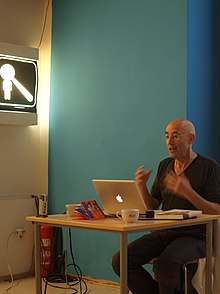| This biography of a living person needs additional citations for verification. Please help by adding reliable sources. Contentious material about living persons that is unsourced or poorly sourced must be removed immediately from the article and its talk page, especially if potentially libelous. Find sources: "Robert Stein" computer pioneer – news · newspapers · books · scholar · JSTOR (May 2023) (Learn how and when to remove this message) |

Robert Stein (born April 20, 1946) is an American businessman. He is a co-founder of The Voyager Company in 1985, the first commercial multimedia CD-ROM publisher, and The Criterion Collection in 1984, a collection of definitive films on digital media with in-depth background information (including the first films with recorded audio commentary).
Born and raised in New York City, Stein attended Columbia University, majoring in psychology. Later, he earned a master's degree in education from Harvard University.
Stein then worked with Alan Kay at the Atari Research Group on various electronic publishing projects.
After Voyager, Stein founded Night Kitchen to develop authoring tools for experimental electronic publishing, primarily TK3.
Stein is the director of the Institute for the Future of the Book. According to Stein: "The Institute has two principal activities. One is building high-end tools for making complex electronic documents (part of the Mellon Foundation's higher-ed digital infrastructure initiative). The other is exploring and hopefully influencing the evolution of new forms of intellectual expression and discourse." This new scholarly direction is being explored under the umbrella of MediaCommons.
In 2019 Stein donated his archival papers and hard drives to Stanford University.
External links
- Bob Stein on the unrecorded history of online publishing, Triple Canopy, July 2010
- Robert Stein by John Brockman
- Bob Stein interviewed on This Spartan Life, August 2005
- "The Teachings of Bob Stein", Wired Magazine, July 1996
- The Institute for the Future of the Book
- if:book, the Institute for the Future of the Book weblog
- "Becoming Book-Like: Bob Stein and the Future of the Book" (Interview)
- MediaCommons
References
- Stanford University, Special Collections, Accessions 2019-472, 2020-017 and 2020-060. Website Stanford University, Special Collections